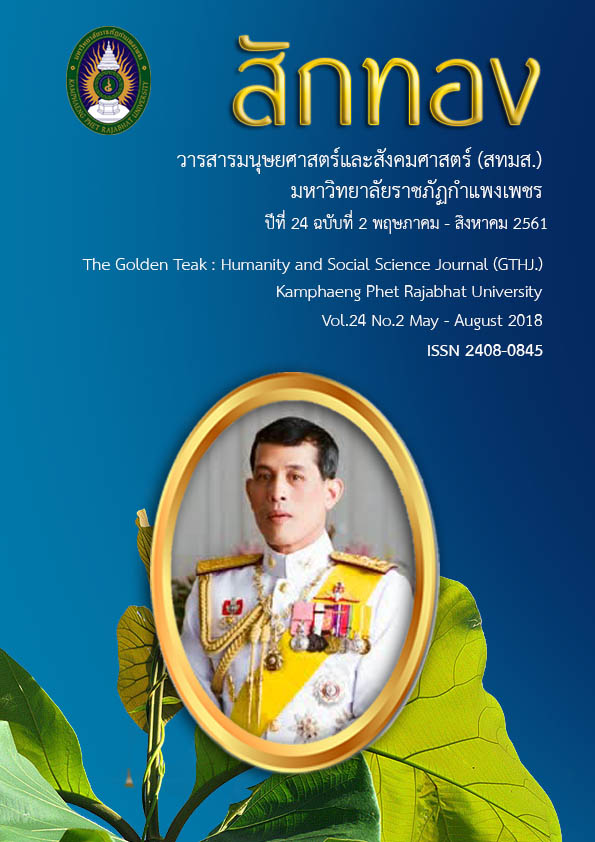Guidelines of School Curriculum Administration for Happiness in the Learnine of School Under Phitsanulok Primary Educational Service Area Office 1
Main Article Content
Abstract
ABSTRACT
The objectives of this research were to study the current situation, problem and the guidelines of the school curriculum administration for happiness in the learning of school under phitsanulok primary educational service area office 1. Part 1 : To study population of the current situation and problem of the school curriculum administration for happiness in the learning of school under phitsanulok primary educational service area office 1. The research instrument was a rating-scale questionnaire with an IOC value of 0.60-1.00 and a reliability of 0.713. The subjects were 295 administrators and theachers of the school under phitsanulok primary educational service area office 1 in 2016. The instruments used of questionnaire research were analyzed by using frequency, percentage, average and standard deviation. Part 2 : To study population of the guidelines of school curriculum administration for happiness in the learning from interviewing 9 professionals by using content analysis. The findings were : 1) The overall and every step of current situation of the school curriculum administration for happiness in the learning was at a high level.The overall and every step of problem of the school curriculum administration for happiness in the learning was at a low level. 2) The guidelines of school curriculum administration for happiness in the learning were (1) Those involved are aware of the benefits and participate in planning to meet the needs of the learner. (2) The action on the school curriculum for happiness in the learning were consistent with The Basic Education Core Curriculum B.E. 2008, the needs of the community and student. Basic subjects must be based on indicators of The Basic Education Core Curriculum B.E. 2008. More courses and student development activities must be based on the needs of the community and student. (3) The school curriculum administration for happiness in the learning must be provided in a relaxed environment and diversity so students must be able to use in daily life. (4) Evaluation and improvement of administration for happiness in the learning of school must cover knowledge, skills, work processes and attitudes. There are methods of evaluation by authentic assessment on its use in daily life.
Article Details
บทความที่ได้รับการตีพิมพ์เป็นลิขสิทธิ์ของวารสาร สักทอง : วารสารมนุษยศาสตร์และสังคมศาสตร์ สถาบันวิจัยและพัฒนา มหาวิทยาลับราชภัฏกำแพงเพชร
ข้อคิดเห็นใดๆ ที่ปรากฎในวารสารเป็นวรรณกรรมของผู้เขียนโดยเฉพาะ ซึ่งมหาวิทยาลัยราชภัฏกำแพงเพชรและบรรณาธิการไม่จำเป็นต้องเห็นด้วย
References
Boonseu, K., et al. (1997). Theory of learning happiness. Bangkok : National Office of Education.
Changkun, W. (2004). Brain-Based Learning. Bangkok : Amarin Printing & Publishing.
Itsara, B. (2007). Development of causal model of happy learning of Mathayom 6 students in Bangkok. Master’s thesis, Chulalongkorn University.
Lohakit, S. (2003). To study of learning mathematics using happy learning model in primary 3 at The Demonstration School of Khon Kaen University (Education) School. Master’s thesis, Khon Kaen University.
Neungchaleng, P. (2010). Education Programs. Mahasarakham : Mahasarakham University.
Ngoummaraporn, P. (2014). A study of curriculum and academic administration in private primary school with the royal award. Master’s thesis, Chulalongkorn University.
Office of the Education Council. (2015). Reform program learning to the learner. 2014-2017. Bangkok : Office of the Education Council.
Panichplinchai, T. (2014). Social science research methodology. Phitsanulok: Faculty of Education Naresuan University.
Pupan, S. (2003). Basic concepts of building and developing curriculums. Chiangmai : The Knowledge Center.
Ruksanitsakul, S. (2014). Guidelines for school administration to enhance happiness in the learning of stateless children. Master’s thesis, Chulalongkorn University.
Srisaard, B. (2011). Basic Research. Bangkok : Suveriyasan.
Suknikom, P. (2003). A study of the principals? Roles on school curriculum management of Phanakhon Si Ayutthaya. Master’s thesis, Phanakhon Si Ayutthaya Rajabhat University.
Vajiramedhi & Jumsai Na Ayudhya, A. (2010, February, 25). V.Vajiramedhi said that children suffering from a lot of Curriculum subjects but do not teach the life skills. komchadluek. [Online]. Available : http://www.komchadluek.net/news/edu-health/49877. [2016, August, 20].


